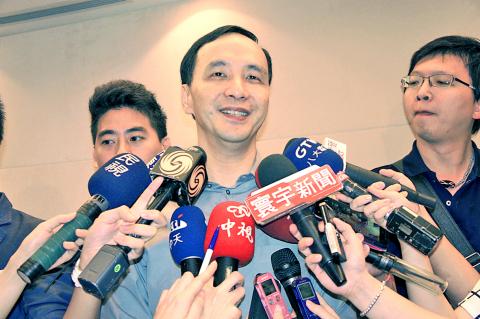New Taipei City Mayor Eric Chu (朱立倫) will run for re-election in the mayoral election in November because he has no other option, Taiwan Solidarity Union (TSU) Secretary-General Lin Chih-chia (林志嘉) — who is also the party’s candidate in the election — told a press conference yesterday.
“I would say [the possibility of Chu running for re-election is] 100 percent. It’s my assessment though — you don’t have to believe me, but time will tell,” Lin said, adding that he had full confidence that he could beat Chu by more than 100,000 votes in the election.
Chu has yet to declare whether he would be running for re-election, fueling speculation that he might decide against doing so and focus on vying for the Chinese Nationalist Party’s (KMT) nomination for the presidential race in 2016.

Photo: Lai Hsiao-tung, Taipei Times
Lin also accused Chu of hushing up his share in a company owned by his father-in-law, Kao Yu-jen (高育仁), worth approximately NT$2 million, on his civil servant’s property declaration in 2010 when he served as vice premier.
Citing information in the annual report of Tai Tung Communication Co, Lin said Chu held 1.05 percent of the company’s shares.
The company, which the Kao family invested in in 2000, had won 160 government bids over the past 14 years, including 47 bids between 2000 and 2001, when Chu was a legislator, on 56 tenders — a 83 percent winning rate, Lin added.
“Chu should offer an explanation, as this is a potential corruption case that involves his integrity,” Lin said.
Chien Sheng-che (簡聖哲), a TSU candidate in the Taipei City council elections, said Chu could have violated the Act on Recusal of Public Servants Due to Conflicts of Interest (公務人員利益衝突迴避法), which prohibits public servants or their families from securing government bids.
According to Chien, Chu had declared the 7.89 percent shareholding of his wife, Kao Wan-chien (高婉倩), in his report in 2010, but left out his own investment in the report.
In response, Chu said yesterday morning before the TSU press conference that the allegation was groundless and was only a campaign activity to boost Lin’s profile.

Taiwan is stepping up plans to create self-sufficient supply chains for combat drones and increase foreign orders from the US to counter China’s numerical superiority, a defense official said on Saturday. Commenting on condition of anonymity, the official said the nation’s armed forces are in agreement with US Admiral Samuel Paparo’s assessment that Taiwan’s military must be prepared to turn the nation’s waters into a “hellscape” for the Chinese People’s Liberation Army (PLA). Paparo, the commander of the US Indo-Pacific Command, reiterated the concept during a Congressional hearing in Washington on Wednesday. He first coined the term in a security conference last

Prosecutors today declined to say who was questioned regarding alleged forgery on petitions to recall Democratic Progressive Party (DPP) legislators, after Chinese-language media earlier reported that members of the Chinese Nationalist Party (KMT) Youth League were brought in for questioning. The Ministry of Justice Investigation Bureau confirmed that two people had been questioned, but did not disclose any further information about the ongoing investigation. KMT Youth League members Lee Hsiao-liang (李孝亮) and Liu Szu-yin (劉思吟) — who are leading the effort to recall DPP caucus chief executive Rosalia Wu (吳思瑤) and Legislator Wu Pei-yi (吳沛憶) — both posted on Facebook saying: “I

The Ministry of Economic Affairs has fined Taobao NT$1.2 million (US$36,912) for advertisements that exceed its approved business scope, requiring the Chinese e-commerce platform to make corrections in the first half of this year or its license may be revoked. Lawmakers have called for stricter enforcement of Chinese e-commerce platforms and measures to prevent China from laundering its goods through Taiwan in response to US President Donald Trump’s heavy tariffs on China. The Legislative Yuan’s Finance Committee met today to discuss policies to prevent China from dumping goods in Taiwan, inviting government agencies to report. Democratic Progressive Party Legislator Kuo Kuo-wen (郭國文) said

The Ministry of Economic Affairs has fined Taobao NT$1.2 million (US$36,900) for advertisements that exceeded its approved business scope and ordered the Chinese e-commerce platform to make corrections in the first half of this year or its license would be revoked. Lawmakers have called for stricter supervision of Chinese e-commerce platforms and more stringent measures to prevent China from laundering its goods through Taiwan as US President Donald Trump’s administration cracks down on origin laundering. The legislature’s Finance Committee yesterday met to discuss policies to prevent China from dumping goods in Taiwan, inviting government agencies to report on the matter. Democratic Progressive Party